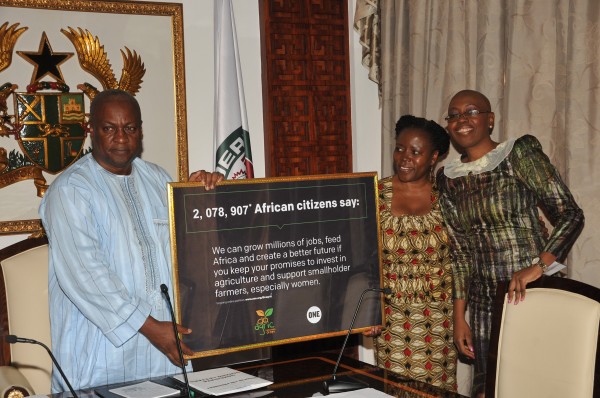ONE applauds AU Malabo Declaration’s re-commitment to agriculture transformation
JOHANNESBURG, South-Africa, July 02, 2014 — ONE.org applauded African Union leaders today for solidifying their commitment to transforming Africa’s agriculture sector by improving upon the 2003 Maputo Declaration, under which they committed to spending at least 10% of their national budgets on agriculture.
The Malabo Declaration, coming out of the 23rd AU Summit of Heads of State and Government in Equatorial Guinea, commits member states to implement a number of essential policy reforms toward ending hunger and cutting poverty in Africa in half by 2025. To meet these goals, African leaders re-affirmed their intention to devote 10% of their national budgets to agricultural development and agreed to targets such as doubling agricultural productivity, halving post-harvest loss, and bringing stunting down to 10% across Africa.
Reflecting on the announcement, Dr. Sipho S. Moyo, ONE.org’s Executive Director for Africa, said:
“This is a defining moment for agriculture in Africa. During this official AU Year of Agriculture and Food Security, African governments have heeded the call of 120 CSOs, and over 2 million African citizens who signed ONE.org’s Do Agric petition calling on them to invest more and better in agriculture. They have raised the bar with the Malabo Declaration, showing a real commitment to smallholder farmers and rural communities across the continent. This declaration is a clear demonstration that our leaders are committed to coming together on behalf of our farmers, our food and our futures.”
The new declaration prioritizes the operationalization of the African Investment Bank, responsible private sector investment, increased support for intra-regional trade, adoption of climate-resilient farming strategies, youth inclusion and employment targets, and mutual accountability for results.
These newly adopted measures form part of a set of joint recommendations put before the AU leaders by ONE.org and about120 civil society partner organizations in the months leading up to the summit, and reflect the voices of over 2 million African citizens who signed ONE’s Do Agric petition.
Presidents Jakaya Kikwete of Tanzania, Yayi Boni of Benin, John Mahama of Ghana and Mahamadou Issoufou of Niger all received and supported the joint recommendations and petition ahead of the June AU gathering. President Kikwete took the stage to formally present them to the Heads of State at the summit. Delegations from Nigeria, South Africa, Zambia, Burkina Faso, Senegal and Mali also received and supported the petition and recommendations at the summit.
However, despite a strong commitment to meet or exceed the 10% budget target, African leaders failed to resolve the debate on establishing a common standard of measurement for the 10%. The declaration also falls short on the closely related issue of improving budget transparency, which makes accountability an ongoing challenge given that agriculture spending is by its nature fragmented across various government ministries, departments and agencies. Furthermore, the declaration is not explicit in its support of multi-stakeholder participation in government-led agricultural development processes, fostering access to markets for small-holder farmers, investing in agricultural research and extension services, closing the gender gap, and improving land rights for the poor.
Audax Rukonge, Executive Director of the Agricultural Non-State Actors Forum (ANSAF) of Tanzania was nonetheless, optimistic about the new declaration:
“Not only does the Malabo Declaration solidify 2003 Maputo Declaration, but it further identifies policy interventions targeted at benefitting smallholder farmers and enhancing their productivity. The smallholder farmers are ready to help ensure food and nutrition security for all African citizens, to grow jobs and boost our economies – and this is possible, if our leaders can now move from the Declaration to its effective implementation.”

About Do Agric, It Pays
ONE.org launched the rigorous Do agric, it pays campaign on January 20 along the margins of the 22nd Ordinary Session of the AU Summit in Addis Ababa, Ethiopia, in support of the 2014 AU Year of Agriculture. In 2012, the AU declared 2014 as the Year of Agriculture, Nutrition and Food Security in Africa, after receiving a petition signed by over 30 000 ONE.org members.
The campaign encourages African governments to keep their 2003 Maputo promise to invest at least 10% of national budgets in agriculture, and makes a case for better strategic policies and transparent public investments that will better support smallholder farmers, especially women, and lift millions of Africans out of poverty.
Do Agric, It Pays was supported by the Caterpillar Foundation, African Union Commission, various farmers’ associations, CSO and private sector partners that include the Bill & Melinda Gates Foundation, Tony Elumelu Foundation, OXFAM, AGRA, ACCORD, ACTIONAID, PAFO, ROPPA, ESAFF, as well as Zambia’s CTPD and IAPRI, Benin’s PASCIB, Tanzania’s ANSAF and TGFA, South Africa’s Agri Youth Indaba and Nigeria’s NANTS, YPAED and BUDGIT.The campaign also benefitted from the support of various media partners including New African Magazine, Mail & Guardian newspaper, MTV Base, Tanzania’s Cloud Media, Africa Magic’s Good Morning Africa, South Africa’s METRO FM, and Nigeria’s Beat FM, Cool FM and Soundcity television.
About ONE.org
ONE.org (http://www.one.org) is a campaigning and advocacy organization of nearly 6 million people taking action to end extreme poverty and preventable disease, particularly in Africa. Strictly nonpartisan, we raise public awareness and press political leaders to combat AIDS and preventable diseases, increase investments in agriculture and nutrition, and demand greater transparency in poverty-fighting programs.ONE.org is not a grant-making organization and does not solicit funding from the public or receive government funding. We achieve change through advocacy. Our teams in Washington, D.C., London, Johannesburg, Brussels, Berlin, and Paris – and soon in Abuja – educate and lobby governments to shape policy solutions that save and improve millions of lives. To learn more, go to http://www.one.org.